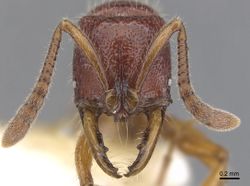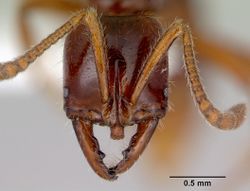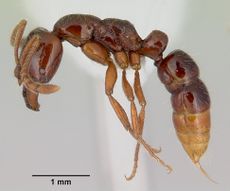Key to Australian Myopias Species
The following key to Australian Myopias is modified from Willey & Brown (1983).[1]
1
- Mandibles triangular, with distinct basal and masticatory borders meeting at a toothlike angle; when fully closed, the blades overlap broadly, leaving only a narrow space between them near the head => Myopias delta
- Mandibles thin and elongate, with basal margin not distinct from masticatory margin, or meeting it at a low convexity or flange; blades separated by a broad gap basally (near the head) when fully closed => 2
2
- Second gastral segment (T4) lower and narrower than the first and tapering gently apicad, not constricted at juncture with first => Myopias densesticta
- Second gastral segment as wide as or wider than first, with distinct basal constriction at its juncture with first => 3
3
- Antennal scape longer (scape length greater than 0.84 mm), in full face view always surpassing posterior border of head when held straight back => Myopias chapmani
- Antennal scape shorter (scape length less than 0.84 mm) (in full face view sometimes not reaching posterior border of head when held straight back) => 4
4
- Petiolar node as seen from the side tapered apicad, with the highest point in front and the dorsal face sloping downward caudad; robust species, dorsoventral thickness of head as seen from the side 0.61 mm or slightly more => Myopias tasmaniensis
- Petiolar node as seen from the side subquadratic, dorsal face convex but horizontal, distinct from both nearly vertical front and rear faces; slender species, dorsoventral thickness of head as seen from the side usually < 0.61 mm => Myopias tenuis
References
- ↑ Willey, R.B. & Brown, W.L., Jr. (1983) New species of the ant genus Myopias (Hymenoptera: Formicidae: Ponerinae). Psyche (Cambridge), 90, 249–285.









